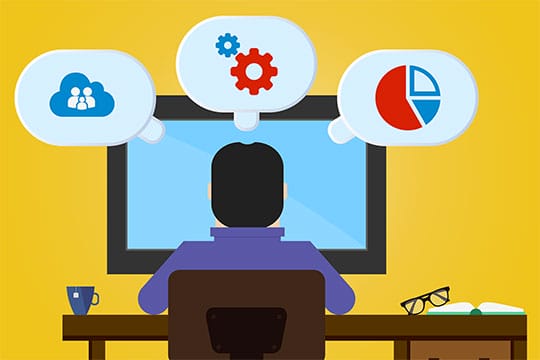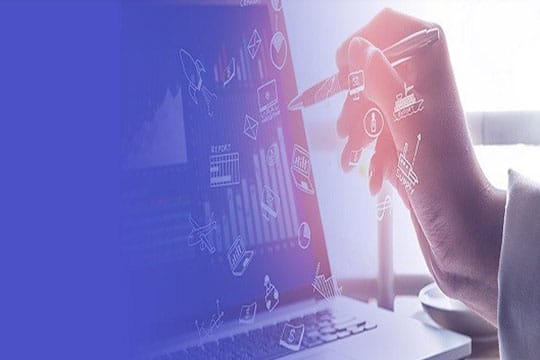Will AI replace software engineers? Well, not in the nearest future. The algorithms need time to become mature enough to pair humans in creating quality code. Yet, there will definitely be more robot-jobs done by machines.
What is left for humans? We will cover this and other questions in this outline related to the future of software engineering. You’ll discover:
- An overview of the current trends in software development.
- A list of the most demanding engineering fields in the future.
- Interesting facts about software engineering.
- Insight about the future jobs of software engineering.
Let’s start our journey to figure these facts!
Future of Software Engineering: What Does it Hold?

Software engineering is about creating computer programs that perform numerous tasks in different human life domains: from business and transportation to healthcare and defense.
Software engineering trends show that things will change in the nearest future: there will be more software programming, and its operations will penetrate new industries and require specialists in the new fields.
Recommended for you: Tips for Self-development as a Remote Software Developer in COVID-19.
Growth of Software Programming

A couple of decades ago, software programming was the realm of tech companies. Now, every business relies on technology. The areas where software programming is employed include banking, healthcare, security, government, science, and marketing.
Geographically, IT-sectors are growing fast in all parts of the world and are expected to gather pace in the next few years. For example, Statista states that 62 percent of Europeans believe that digital transformation speed will increase significantly in the coming years, so software engineering cannot yet be called a dying field.
Application of Software Engineering in All Major Industries

Now, let’s mention how technology and programming will affect the key industries.
- Health Tech: Software engineering revolutionizes the collection and processing of health data giving unpaired possibilities for diagnostics and disease prevention.
- eLearning: Ordering education materials online is the new normal of today. The eLearning market is projected to reach over 370 billion U.S. dollars, compared to 101 billion U.S. dollars in 2019 (Statista, 2019).
- eCommerce: Since online shopping is expected to double by 2023 and is projected to reach 6.3 trillion U.S. dollars, eCommerce software development is now the hottest area to employ software engineers.
- FinTech: The rise of online and mobile payments and alternative finance is driving demand for financial management solutions. According to statistics, 66.7% of bank executives say they already collaborate with fintech and big tech companies to create new services for their customers.
- R&D: In their chase for innovative solutions and discoveries, corporations and governments heavily rely on innovative tech solutions. This trend is going to gain momentum, as the research and evolution of software programming will strongly depend on Artificial Intelligence and Machine Learning solutions in the nearest future.
The future of software engineering implies that programming will penetrate almost all business areas as well as in daily lives. At the same time, more operations will be mobile-based.
Thus, if you have a great new digital product concept, your next step is to search for high-quality app development services. Top IT companies provide an all-in-one approach in software development to implement your business vision into a high-performing technical product.
High Demand for Skilled Software Engineers

With more automation and AI growth, the question of whether software engineers will be needed in the future becomes frequently asked. Definitely, the number of routine tasks to be passed over to machines will increase. Yet, there is still space for new solutions and research in new dimensions of software engineering.
Thus, according to many studies, there will be a growing demand for developers of voice recognition technologies, artificial intelligence, augmenting software, and blockchain technology in the nearest decade.
Key 10 Software Engineering Trends

We believe that the future of software development still holds a lot of surprises and discoveries we can’t predict. Yet, the software engineering trends of today cast light on what to expect.
1. Cloud-based Services

In the nearest future of software engineering, we may expect that cloud storage’s functionality and size will increase. At the same time, the prices should drop.
With Amazon, Microsoft, and Google now dominating the field of cloud computing, the next decade may give rise to an immense number of start-ups with new cloud solutions.
2. Low-code Development

Low-code-No-code development or LCNC is a relatively new trend. Some companies lower the entry-level into software development based on the lack of specialists for implementing all software ideas.
“Some tech companies begin to introduce solutions that allow people with low or no programming skills to incorporate their ideas. This trend is quite popular with BigTech companies like Google and Amazon.” – as explained by Anton Sakharov, the founder and CTO of MLSDev, in one of his recent interviews.
In this way, the person can test an idea without involving the tech team and implement it only when the concept proves viable. LCNC helps save time, money, and human resources and paves the paths for innovations, as bright ideas often get started in non-techie people’s heads.

3. Artificial Intelligence & Machine Learning

The last decade was an incubator of AI start-ups and ideas, so no wonder that the further growth and expansion of AI will be a prevailing trend in 2020 and the future of software engineering.
For now, AI and ML solutions find implications in eCommerce, providing great insights into customer behavior, discovering business trends, and building reliable forecasts.
AI implementation involves the creation and training of machine learning models that can imitate human intelligence: visual perception, speech recognition, and decision making. As such, today’s AI is in high demand for:
- Customer analytics to predict customer behavior and forecast sales, provide personalized content recommendations.
- Business process automation with AI-driven chatbots, search engines, automated document generation, and processing, etc.
- Supply chain analytics to forecast demand and lead times, optimize inventory.
In the future, AI is forecasted to strengthen its positions in areas like healthcare, finance, science, research, and many others.
Despite the great possibilities AI gives us today, it is still far from perfection. Developers all over the world struggle to create “real” artificial intelligence able to perform difficult tasks without human intervention. There is much space for innovation and discoveries in the sphere of AI, and the demand for developers in this area will be growing.
You may like: 10 Video Editing Software to Use from Beginners to Professionals.
4. New Reality with VR & AR

With the rise of new technologies in software development, augmented and virtual reality solutions are projected to accelerate.
In the coming years, VR and AR will be widely used in healthcare, education, science simulations, e-commerce, and education, not to mention gaming and social media, providing great benefits.
For example, virtual fitting rooms today change the way people shop. Application of AR/VR/MR solutions in learning creates completely new study paths while substituting the need to imagine things based on descriptions. In healthcare, these technologies help to visualize the human body better, expanding diagnostic possibilities.
5. Introduction of New Programming Languages

With artificial intelligence and machine learning growth, programming languages should respond to new challenges faster than their predecessors. Today, the software’s leading positions are taken by Java, JavaScript, C, and Python.
Yet, Python is named the most flexible software programming language suitable for machine learning, deep data analytics and processing, and programming hardware for space discovery.
Still, Python is a veteran compared to the languages that are gaining popularity now. Swift, Kotlin, Rust, TypeScript are flexible enough to keep pace with the changing world of software development and therefore are believed to hold firm positions in the future of software engineering.
6. Continuous Integration & Continuous Deployment

Both continuous integration and continuous deployment allow programmers to streamline and accelerate software development operations.
Continuous integration lets a team of developers merge their work efforts. Thus, the product gets updated after every change is made, and developers don’t need to wait for weeks before committing their code pieces.
Continuous deployment streamlines building, testing, configuring, and deployment of code to production environments automatically. While reducing manual processes at releases, companies eliminate the risks of issues and unsuccessful launches.

7. IoT Sets the Future of Software Engineering?

Since we live in the era of everything being connected, the Internet of Things is projected to grow. Statista reports that by the middle of 2020s, the IoT market’s total value will make 1.6 trillion U.S. dollars. This fact means that in the future of software engineering, a lot of attention will be given to the development of sensors, programming machines, devices, and self-driving vehicles.
8. Enlargement of Big Data

More people leave their digital footprint on the web, creating unseen possibilities for companies to turn these data for profit. Yet, there is a pressing need for tools to collect, analyze, and process information from emails, social media, polls and reviews, and so on.
In 2020 and further, the amount of online information will grow; the demand for programmers to create solutions for Big Data doesn’t seem to decline.
9. High Potential of Blockchain Technology

Blockchain will remain one of the hottest software development trends. It gives unparalleled possibilities to secure valuable data, so no wonder that it found its first users in the spheres of finance and healthcare.
Other areas of human lives may benefit from blockchain too. Big investments are made in the development of blockchain solutions for logistics, real estate, automotive, crowdfunding, and so on.
10. Cybersecurity

As the technology paces on, cybercrime becomes more elaborate and sophisticated. Security breaches, data loss, phishing attacks, and privacy violations are a new reality, and this trend seems to persist.
Therefore, in the future of software engineering, more corporations, governments, banks, and medical establishments will invest heavily in the security sector.
You may also like: How to Choose the Right Accounting Software for SMBs?
How the Future of Software Engineering Impacts Our Lives?

Machine learning, cloud, and quantum computing, and security are the main areas to pay attention to in 2020+. These areas will undoubtedly remain hot in the next decades. They will definitely provide an excellent environment for successful start-ups and discoveries, one of which may become your future success.
As we expect many unpredictable developments, the ability to be flexible and adapt to the changing demands of the market will be the most valuable feature of the future developer. Still, solid knowledge in computer science, technologies like JavaScript, Java, C, and Python will be valued. It is also worth paying attention to newly emerged technologies and programming languages like Kotlin, Rust, and TypeScript.





